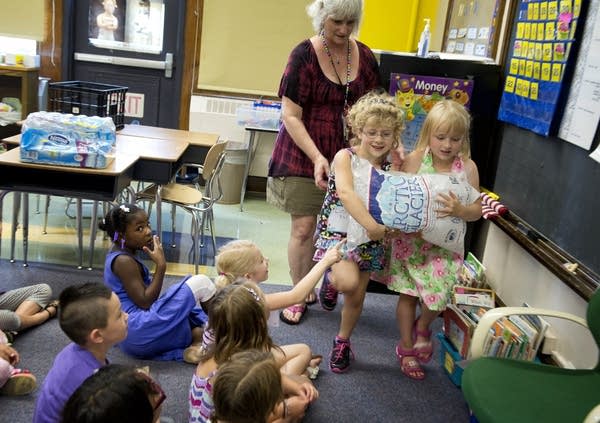From New Ulm to Mankato, students swelter

Schools across southern Minnesota on Tuesday canceled or postponed athletic practices and released students early from school buildings without air conditioning as a heat wave continued.
It wasn't the ideal way to start off the school year, said Father Matthew Wiering, principal at Cathedral High School in New Ulm, where classes were dismissed at 11:44 a.m. because of a lack of air conditioning.
"It was kind of like just walking around in heated air, and there were fans everywhere, all of our windows were open, but you're blowing around hot air so it didn't make any difference," Wiering said of the school's first day of classes.
Temperatures inside the three-story building reached 85 degrees, he said, and students will be released early again on Wednesday.
Create a More Connected Minnesota
MPR News is your trusted resource for the news you need. With your support, MPR News brings accessible, courageous journalism and authentic conversation to everyone - free of paywalls and barriers. Your gift makes a difference.

"We asked the teachers to be attentive to any kids who might be experiencing heat-related health issues and encouraging them between every class — drink water, drink water, go to the water fountains, go to the bathroom and splash water on your face, do whatever you need to do," he said.
An excessive heat warning remains in effect until midnight for three dozen southern Minnesota counties, including the Twin Cities metro area. The rest of the southern half of the state was under a heat advisory.
Officials in Fargo, N.D., canceled classes through Wednesday at five elementary schools that don't have air conditioning, and classes at St. Francis School in Rochester will be dismissed at 1:30 p.m. throughout the week because of the heat.
In the Twin Cities, the Minneapolis Public Schools decided against releasing students early but have canceled athletic practices and other after-school activities. A group of students, parents and teachers planned a news conference Tuesday afternoon at Patrick Henry High School to denounce the sweltering conditions. In a news release, they said the lack of air conditioning at the school was another example of the state's inequitable education system.
The St. Paul Public Schools moved afternoon athletic practices and games to the evening and officials said practices would be less strenuous and coaches would give student athletes frequent breaks.

Most Minnesota schools don't begin classes until after Labor Day, but athletic programs throughout the state were in full swing. At Mankato East High School, a tennis match was moved from the afternoon to the morning, and football practices were scheduled for 8 p.m., said athletic trainer Troy Hoehn.
"By far, of all the cases of sudden death in high school kids, heat illness is the only one that's 100 percent preventable, so we want to make sure that we just don't potentially put them in a situation where bad things could happen," he said.
Hoehn said the death of Minnesota Vikings offensive tackle Korey Stringer at training camp in 2001 helped raise awareness about practicing in the heat. But he said schools have gotten even more serious about the issue in the past five years following the heat-related deaths of several students in other states.
"It's definitely something that, you know, 10 to 15 years ago we never even talked about much. We always knew it was hot but never really made much for precautions, whereas now we know the dangers that exist," he said.
Pushback from coaches and players is rare, Hoehn said. "Typically the athletic trainer is the one that people go to to get that advice, and if that's the advice that they give, then they just deal with it."
